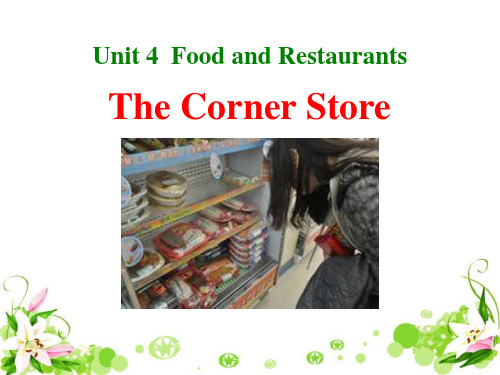《At the Market》Food and Restaurants PPT课件【精选推荐课件】
- 格式:pptx
- 大小:1.75 MB
- 文档页数:22
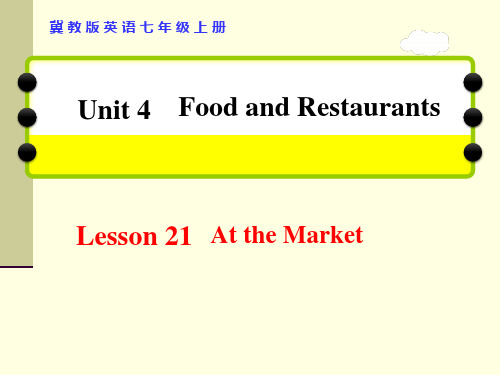

2020学年冀教版英语精品资料新冀教版七年级上册Unit4课文重点整理(Lessons 19-21)Unit 4: Food and ReastaurantsLesson 19: Time for Breakfast1、 seven fifteen____________________ m a k e a s a l a d________________________ 一些面包_______________________ 一杯果汁___________________________ some cereal______________________ p u t…o n…_________________________ 一杯茶_________________________ 你呢?_____________________________2、 Time for breakfast! 该吃早饭了!这一句省略了It is,原句型为It is time for sth.,意为“到……的时间了”;表达“到做某事的时间了”,用It is time to do sth.;表达“到某人做某事的时间了”,用It is time for sb. to do sth.。
例如:李明,到你擦黑板的时间了。
_____________________________________________________ 该吃午饭了。
_____________________________或____________________________________ 3、What’s for breakfast? 早饭吃点儿什么?for breakfast作“早餐”讲。
介词for在这里的意思是“作为”,但通常不翻译。
“What’s for + 三餐”表示“三餐吃什么?”。
这是一句泛泛的说法,在具体的应用中,常用“What do you have for …?”来向对方提问。

2025届湖北省武汉市硚口区高三起点考试七月质量检测英语试卷一、阅读理解Where to eat in MalaysiaMalaysia offers a wide range of food choices, ranging from fine dining to street food. Elsewhere, restaurants and food stalls are readily available.Old China CafeEating here is a little like dining in a museum as the walls are lined with photos and memorabilia of the local Chinese laundryman’s association. Chinese and Asian dishes keep regulars and travellers coming back for more. The menu changes monthly.San PedroThis restaurant serves Portuguese cuisine. Try the baked fish (seabass or red snapper), curry debal chicken (can be quite spicy), fried brinjals and the black pepper crabs, Call ahead to reserve a table (and your fish), because once their fish runs out, they will close for the day.The BungalowFacing the hotel pool and the beach, this restaurant has indoor and outdoor seating. At night, the atmosphere is very romantic. The Chinese menu concentrates on traditional Hainanese dishes, but includes dishes such as fish curry, chicken rice and filet mignon.No. 7 Sup CornerEven if you miss this buffet-style restaurant at the road bend, you will not miss the number of cars parked at the road shoulder or the locals heading to it during lunchtime. It serves Malay dishes. First get your plate of rice, and then take whatever you would like to eat. Present your food plate to the lady at the counter and pay for it. Closed on Fridays and during Ramadan. Come early as there’s always a crowd outside.1.What do Old China Cafe and the Bungalow have in common?A.They are based in hotels.B.They have seasonal set menus.C.They have atmospheric settings.D.They adopt modern cooking methods. 2.Which restaurant serves western cuisine?A.Old China Cafe.B.No.7 Sup Corner.C.The Bungalow.D.San Pedro.3.What do we know about No. 7 Sup Corner?A.It is inconveniently located.B.It is a self-service restaurant.C.It requires a restaurant booking.D.It opens every day except the weekends.Norwegian playwright and author Jon Fosse has just been awarded the 2023 Nobel Prize in Literature for his “innovative plays and prose which give voice to the unsayable”.The Swedish Academy credits Fosse as “one of the most widely performed playwrights in the world”, although the 64-year-old originally made his name as a novelist, beginning with Red, Black in 1983. He has since written many works of prose and poetry. “His literary works, spanning a variety of genres(体裁), comprises about 40 plays and a wealth of novels, poetry collections, essays, children’s books and translations,” said Anders Olsson, chairman of the Nobel Committee for Literature.Jon Fosse draws inspiration from his rural living environment and personal struggles, which have deeply influenced his distinctive writing style. Growing up in a small coastal village, Fosse was immersed in the beauty of nature and the vastness of the sea, which filled him with a sense of solitude and introspection(内省) that is reflected in his works. Fosse’s writing discussed themes of desolateness(孤独,苍凉), longing, and the search for meaning in life. Additionally, his battles with depression have enabled him to explore the depths of human emotions and existential des-pair.“He touches you so deeply when you read his works,” said Anders Olsson. “What is special about him is the closeness in his writing. It touches your deepest feelings-anxieties, insecurities, questions of life and death-which are things that every human being actually faces from the very beginning. In that sense I think he reaches very far and there is a sort of a universal impact of every-thing that he writes-it has appeal to this basic humanity.”Fosse is the first-ever laureate writing in Nynorsk, one of the two official languages of Norwegian, but only used by just 10% of the population. As The Guardian writes, “Many Nynorsk speakers see Fosse ‘as a kind of national hero’ for his championing of the language.” Fosse’s recognition on a global stage promotes the visibility and importance of Nynorsk as a writtenstandard. It will attract more attention to Nynorsk literature, inspire and encourage Nynorsk speakers to continue preserving and promoting their linguistic(语言的) heritage.4.What do we know about Jon Fosse from paragraph 2?A.His most popular work is the play Red, Black.B.He accomplished various genres of literature works.C.Many famous plays are the inspiration for his writing.D.His language skills earned him the Nobel Prize in Literature.5.What does paragraph 3 mainly talk about?A.Jon Fosse’s tough experiences.B.Jon Fosse’s motivation for writing.C.The major themes of Jon Fosse’s works.D.The effect of Jon Fosse’s life on his writing style.6.What is special about Jon Fosse’s works according to Anders Olsson?A.They explore the meaning of life.B.They touch human’s deepest emotions.C.They show the bond between humans and nature.D.They appeal to readers to focus on personal feelings.7.What contribution of Jon Fosse is mentioned in the last paragraph?A.He explains the importance of linguistic diversity.B.He has improved the international status of Norway.C.He promotes the development and preservation of Nynorsk.D.He shapes the basic writing standard of Norwegian literature.It’s one of the most common questions adults ask children: what do you want to be when you grow up? Although childhood is supposed to be fun, kids also discuss important topics regarding their futures. Now, a new study finds that children who set big goals regarding their future status and education often set themselves up for success as they age.The findings, published in the Journal of Personality and Social Psychology, are the first to reveal a connection between life goal development and future success in school or the workplace. Rodica Damian, an associate professor of psychology at the University of Houston, and otherresearchers discovered that as children grow up, their goals naturally begin to change. However, as some childhood goals fall away, other goals related to a family stay strong. These include being close to relatives, building more friendships or finding a romantic partner, and even becoming more involved in your community or helping others.During the study, researchers compared how their goals evolved as children moved from adolescence to adulthood and how a person’s goals impacted their success in school and as an employee later on. Overall, a child’s goals focusing on their education and future status were the most consistent predictors (预测因素) of income in adulthood. Simply put, when a child dreams big about doing well in school or achieving great success as an adult, these goals accurately paint a picture of how successful these children will be. So, the message is simple: dream big and dream of success, kids! Those goals can drive you to success when you grow up!“Our work proves a strong connection between a child’s life goals, educational achievement, and future occupational outcomes. This information is valuable for parents and educators who can use it to encourage children to set ambitious goals. Additionally, it helps develop strategies to support individuals in achieving their goals and reaching their full potential,” Damian concludes. 8.What does the study mainly focus on?A.Why children change their dreams over time.B.Whether childhood goals relate to future success.C.Whether early education determines future career.D.How childhood experiences impact a person’s choice.9.Which of the following goals remains strong as children grow up?A.Connecting with others.B.Achieving academic success.C.Hunting for a high-salary jobD.Improving personal social status.10.What message does the author convey in paragraph 3?A.Dreaming big is potentially associated with success.B.Childhood achievement s greatly affect future careers.C.Educational goals may be more achievable than others.D.Adjusting goals can create new opportunities for success.11.What is the purpose of the last paragraph?A.To explain the purpose of the study.B.To offer suggestions for future studies.C.To stress the significance of the study.D.To point out the limitations of the study.Spiders are master builders, expertly turning silk into complex 3D webs that serve as their home and hunting ground. To gain a deeper understanding of their world, scientists have translated the structure of a spider’s web into music.“The spider lives in an environment of vibrating (振动的) strings,” says Markus Buehler, the project’s principal investigator. “They don’t see very well, so they perceive their surroundings by detecting vibrations, which have different frequencies.” Such vibrations occur, for example, when the spider stretches a strand of silk during construction or when the wind or a trapped fly moves the web.The researchers scanned a natural spider web to capture 2D cross-sections and reconstructed its 3D network using a mathematical model. They assigned different frequencies of sound to strands of the web, creating musical “notes” that they combined in patterns based on the web’s 3D structure to generate music. Then they made a harp-like (像竖琴的) virtual instrument and played the spider web music in several live performances around the world, creating an inspiring harmony of art and science.To gain insights into how spiders build webs, the researchers also scanned a web during construction, transforming each stage into music with different sounds. “The spider’s way of ‘printing’ the web is remarkable because no support material is used, as is often needed in current 3D printing methods,” Buehler says. This knowledge could help develop new 3D printers that work like spiders, enabling them to construct complex structures without using additional materials for support.The team is also interested in learning how to communicate with spiders in their own language. They recorded web vibrations produced when spiders performed different activities, such as building a web, communicating with other spiders or sending signals to admirers. “Now we’re trying to generate signals to basically speak the language of the spider,” Buehler says. “If we expose them to certain patterns of vibrations, can we affect what they do or can we begin to communicate with them? Those are really thrilling ideas, and I believe they could be achieved inthe near future.”12.What do we know about spiders?A.They have good eyesight.B.They adapt to surroundings quickly.C.They spin a web similar to a musical structure.D.They sense the environment through vibrations.13.What is paragraph 3 mainly about?A.Steps to create spider web music.B.Ways to recreate a web’s 3D network.C.Challenges of combining music with science.D.The potential applications of 3D printing methods.14.What do the underlined words “This knowledge” in paragraph 4 refer to?A.3D printers can construct complex structures.B.Spiders’ vibration patterns vary with activities.C.Spiders build webs without using additional materials.D.The web-building process can be translated into music.15.What is Buehler’ attitude towards communicating with spiders?A.Hopeful.B.Doubtful.C.Uncertain.D.Disapproving.The storms in our lives often leave behind gifts if we open our eyes to see them. As the skies clear and you start to emerge from the loss, look for the silver linings. 16 Going through difficulties requires courage and determination. You have to dig deep and find the strength you didn’t know you possessed to overcome the challenges. 17 That self-knowledge and confidence in your abilities will serve you well going forward.Coming out the other side of trouble sometimes gives you a fresh outlook. Priorities shift.18 You have a deeper appreciation for life’s simple moments and clarity about what matters. Use that insight to guide your choices and cherish each day. 19 The old way of doing things no longer works, so you must rebuild and reimagine your life. Though change is hard, it opens up possibilities for new growth and exciting adventures. Look at this as a chance for a fresh start. You can pursue new dreams or make along-wished-for switch in your situation. The future isunwritten.Your struggles and pain have given you understanding for what others maybe going through in their own lives. You now recognize the suffering of people around you and desire to help ease their burdens. Use your experience to be there for friends and family members facing difficulties.20 Your sympathy can make a real difference.A.Dramatic changes often lead to transformation.B.They’re there if you are bent on searching for them.C.Offer a listening ear and share your story with them.D.Storms shape us, but the silver linings make us suffer.E.What seemed important before now pales in comparison.F.Now you know you have the inner power to weather storms.G.This new perspective removed previous doubt about yourself.二、完形填空In my early thirties, I decided to climb Mount Kilimanjaro, the highest mountain in Africa at 5, 895meters above sea level.After months of preparation, I started my great 21 . At the base of the mountain, I met Mik, a local porter, who warmly 22 me. Mik’s job was to carry my equipment up the mountain, set up the tent, and carry everything back down after reaching the 23 .The first day of the climb was 24 the rain forest, across a slippery , muddy ground covered with tree roots and vines (藤蔓). Mik was carrying 30 kilos on his head! By that evening, we made it to 3,000meters. The air was 25 and it was colder. When I arrived at the campsite for the night, my tent was already set up and waiting for me.Day two was much steeper and rockier. I really had to 26 what I was doing. And I felt guilty for the tough 27 Mik had to work in. Yet when I turned to Mik, he said with the biggest smile, “pole, pole,” which means “ 28 , take it easy” in his native language. I 29 back, my burden lighter somehow.Over the next five days, the climb got 30 difficult. The temperatures could 31 from 21℃to below freezing in a few hours. At 5, 700 meters, there’s only half the oxygen 32in each breath compared to at sea level. That leaves many people with severe headache. Yet Mik always had a smile and a positive attitude. It had an enormous impact on me, giving me the 33 to keep going.Even today, when I find myself 34 with anything in life, I just think back to Mik and his smile. A great attitude can bring joy to those around you, or even 35 strangers to the top of a mountain.21.A.performance B.business C.presentation D.adventure 22.A.questioned B.congratulated C.greeted D.invited 23.A.base B.peak C.forest D.border 24.A.outside B.beside C.through D.over 25.A.thinner B.softer C.drier D.sweeter 26.A.focus on B.turn on C.bring up D.break up 27.A.locations B.conditions C.atmosphere D.competition 28.A.stop B.hurry C.relax D.move 29.A.ran B.talked C.smiled D.rode 30.A.slightly B.increasingly C.automatically D.equally 31.A.swing B.circle C.climb D.last 32.A.predictable B.available C.noticeable D.affordable 33.A.impression B.platform C.opportunity D.strength 34.A.cooperating B.struggling C.associating D.communicating 35.A.persuade B.introduce C.motivate D.recommend三、语法填空阅读下面短文,在空白处填入1个适当的单词或括号内单词的正确形式。

UNIT 4Food and RestaurantsLesson 19Time for Breakfast!核心单词1. ________ n. 糖2. ________ n. 杯子3. ________ n. 餐馆4. ________ v. aux. 将;愿意(用以提出建议或邀请)5. ________ num. 十五6. ________ n. 色拉(凉拌生菜)7. ________ adj. 美味的,可口的8. cereal n. ________单词变形I'd→________(完整形式)核心短语1. ________________________一玻璃杯/杯……2. ________________________把……放在……上重点句型1. 该吃早饭了!________ ________ breakfast!2. 爸爸,早饭吃什么?________ ________breakfast,Dad?3. 那么早饭我想吃一些面包,喝一杯果汁。
Then I would like some bread and ________ ________ ________ ________ for breakfast.4. 我可以吃些麦片粥和糖吗?________ ________ ________ some cereal and sugar,please?5. 我想把糖放在麦片粥里。
I want to ________sugar ________ my cereal.Lesson 20I Like the Supermarket!核心单词1. ________ n. 肉2. ________ n. 饼干3. ________ adj. 满的,充足的4. ________ n. 巧克力5. ________ n. 工作6. ________ pron. 一切事物单词变形job→________(同义词)核心短语1. ________________________不得不2. ________________________充满……3. ________________________写下来4. ________________________去超市重点句型1. 丹尼,我得去超市了。

Unit 4 Food and RestaurantsLesson 22 In the Restaurant课时分层训练(二十二)[Lesson 22]Ⅰ.根据句意及汉语提示完成句子1.I want to ________(点) a cup of coffee.2.Mary likes eating ________(饺子).3.The only ________(问题) is that it's too big for your room. 4.We would like two ________(瓶) of water.5.There are many dishes on the ________(菜单).Ⅱ.用方框中所给词的适当形式填空problem, bottle, dumpling, menu,order1.I don't know what to eat. Let me look at the ________ first. 2.________ are traditional food in China.3.I want ________ a pair of shoes on the Internet(网络).4.My sister and I have different ________ in our lessons.5.How many ________ of juice would you like?Ⅰ.单项填空( )1.Danny would like some ________ and ________.A.dumpling; soupB.dumplings; soupsC.dumpling; soupsD.dumplings; soup( )2.My friend and I are ready ________ lunch.A.have B.hasC.will have D.to have( )3.—________ for the red apples?—They are ten yuan.A.How many B.How muchC.How tall D.How old( )4.I feel so thirsty. I would like some ________.A.cup of tea B.glasses of watersC.cans of coke D.bowls of rice( )5.Dumplings with meat and cabbage ________ 20 yuan. A.is B.are C.has D.have( )6.I'm hungry. I'd like something ________.A.eat B.eats C.to eat D.eating( )7.—Would you like some orange juice, Linda?—________. It's my favourite.A.Yes, please B.No, thanksC.Yes, I do D.No, I'm not thirsty( )8.—________ would you like, please?—Dumplings ________ meat and carrot.A.What; of B.What; withC.What; for D.Which; with( )9.—Which do you like to drink, juice ________ coffee? —Juice.A.and B.butC.so D.or( )dies and gentlemen, attention, please(请注意). I have ________ to tell you.A.something B.anythingC.nothing D.everythingⅡ.根据汉语意思完成句子,每空一词1.“你们准备好上课了吗?”“是的,准备好了。
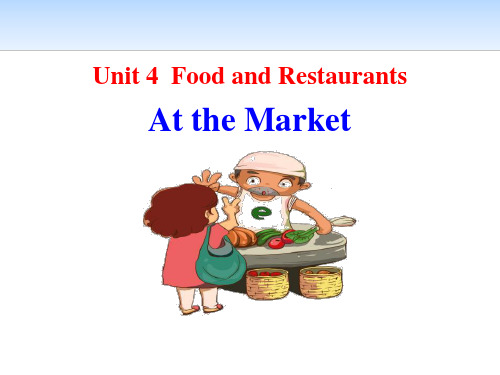
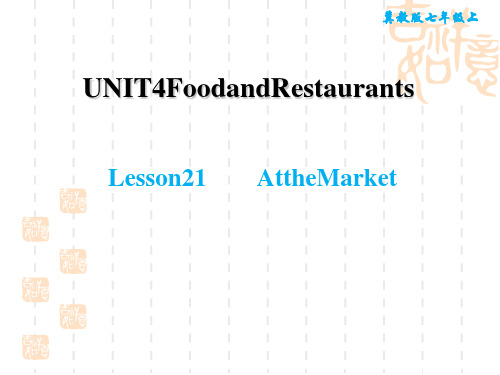
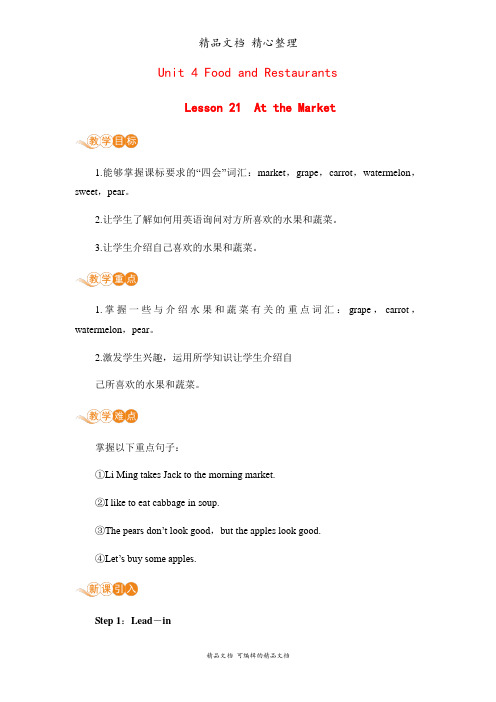
Unit 4 Food and RestaurantsLesson 21 At the Market1.能够掌握课标要求的“四会”词汇:market,grape,carrot,watermelon,sweet,pear。
2.让学生了解如何用英语询问对方所喜欢的水果和蔬菜。
3.让学生介绍自己喜欢的水果和蔬菜。
1.掌握一些与介绍水果和蔬菜有关的重点词汇:grape,carrot,watermelon,pear。
2.激发学生兴趣,运用所学知识让学生介绍自己所喜欢的水果和蔬菜。
掌握以下重点句子:①Li Ming takes Jack to the morning market.②I like to eat cabbage in soup.③The pears don’t look good,but the apples look good.④Let’s buy some apples.Step 1:Lead-inLead-in by showing some pictures of different fruit and vegetables. Let the students reserve in groups and ask questions about the pictures. Then present their questions in front of the class.Step 2:ListeningListen to the tape and know about the main points of the lesson. At the same time,fill in the blanks with the words you hear:1.Many people buy________in the morning market.2.Jack’s favourite vegetable is________.3.Li Ming likes to eat________.Finish the task in class orally.Step 3:ReadingRead the lesson and answer the following questions:1.What is Li Ming’s favourite fruit?2.How does Jack eat cabbage in Canada?3.What does Jack buy,pears or apples?Finish the task in class orally.Step 4:PracticeWrite a note to introduce your favourite fruit and vegetable.Work in groups to finish the task. After a while,let some groups present their notes in front of the class.When the students are writing,the teacher can walk around the classroom tosolve the problems that probably happen.Step 5:e to “Let’s Do It!”Listen to the tape and finish Exercise 1 together. Read the lesson again,and then ask the students to finish Exercise 2.Ask the students to finish Exercise 3 by themselves.1.Finish Exercise 4 in “Let’s Do It!”.2.Write a note to introduce your favourite fruit and vegetable.。

七年级(上) 英语 冀教版22 U N I T 4Food and RestaurantsLesson 19(10min.)一㊁单项选择1.I like porridge C breakfast,and I usually put milk and sugar it.A.for;forB.on;inC.for;onD.on;for2.It’s time C math class.A.atB.onC.forD.to解析:本题考查固定句型It’s time for sth.,意为 到做某事的时间了”,故用for㊂3. Would you like a cup of tea? B .A.No,I wouldn’t B.Yes,please C.No,I don’t D.Yes,I would4. What would you like to drink? A .A.I’d like some coffeeB.Yes,pleaseC.No,pleaseD.Some apples,please解析:由what 引导的含有would like 的特殊疑问句,回答时要根据实际情况,用I’d like来回答㊂题中问句句意为 你想喝点什么?”,D 项为 一些苹果”,不符合题意,故选A㊂5. A ?My favourite food is fish.A.What’s your favourite foodB.Can I help youC.Do you like fishD.Would you like some fish二㊁完成句子:根据所给汉语完成下列各句1.该吃晚饭了㊂It’s time for supper.2.你们喜欢面包吗?Do you like bread?3.午饭吃什么?What’s for lunch?4.我最喜欢的食物是粥㊂My favourite food is porridge.5.詹妮把奶和糖加进粥里㊂Jenny puts milk and sugar on the porridge.第一题10分,第二题10分,总计20分□未达标 □达标(12分) □优秀(16分)七年级(上) 英语 冀教版23 Lesson 20(10min.)一㊁完成句子:根据所给汉语完成下列各句1.我不得不去上学了㊂I have to go to school.2.瓶子里装满了可乐㊂The bottle is full of /is filled with coke.3.你想要吃点什么?What would you like to eat?4.你必须写下你的目标㊂You have to write down your goal.5.没出什么事吧?Is everything all right?6.他不想去超市㊂He doesn’t want to go to the supermarket.二㊁按照正确的顺序重新排列下列对话A.What about some milk?B.Mom,I’m hungry.I want something to eat.C.Thank you,Mom.Could I have something to drink?D.OK.Here you are.E.Yes,there is some.Here you are.F.No,I don’t like eggs at all.G.What about some rice?H.OK.Can I have two bottles of milk?I’ll give one of them to Lily.She likes milk very much.I.What would you like?Would you like some eggs?J.I like it a little.But is there any bread in the fridge?I like bread a lot.1. B 2. I 3. F 4. G 5. J 6. E 7. C 8. A 9. H 10. D 三㊁用方框中所给单词的适当形式填空,每词限用一次nearly busy milk herself wear1.My parents are very busy every day except weekends.2.If you don’t sleep well,you can drink some milk before you go to bed.3.She often wears a white dress.White is her favorite.4.Susan cooked dinner for herself when she studied in Canada.5.I have learned English for nearly 10years and I’m very good at it.第一题12分,第二题10分,第三题5分,总计27分□未达标 □达标(16分) □优秀(22分)七年级(上) 英语 冀教版24 Lesson 21(10min.)一㊁汉译英1.早市morning markets2.在市场上at the market3.我最喜欢的蔬菜my favourite vegetables 二㊁根据句意及首字母或汉语提示补全单词1.The candy is so sweet.2.These grapes are purple.3.My favorite fruit is watermelons(西瓜).三㊁用所给词的适当形式填空1.My favourite food is(be)donuts.2.I want to eat(eat)dumplings.3.I have six apples(apple).4.He doesn’t like(not like)noodles.5.I do my(I)homework in the evening.6.I don’t(not)like fish.7.There are eleven peaches(peach)on the table.8.He likes(like)pears best.9.Tom gives him some fruit(fruit).10.Would you like some dumplings(dumpling)?四㊁补全对话1. What’s your favourite fruit? Bananas.2. How many pears would you like,Wang Hong? Twelve.3. Do you like fish,Li Ming? No,I don’t like it.4. My favourite food is dumplings.What about you? My favourite food is donuts.5. Where are the pears? They are in the box.第一题3分,第二题3分,第三题10分,第四题10分,总计26分□未达标 □达标(16分) □优秀(21分)七年级(上) 英语 冀教版25 Lesson 22(10min.)一㊁用括号内所给单词的适当形式填空1.I’m thirsty.I want to drink(drink).2.His father’s favourite food is(be)beef.3.I don’t like(not like)coke.4.How many dumplings(dumpling)do you want?5.Noodles are(be)delicious.Would you like some?二㊁单项选择1.I’m hungry;I want some B .A.fishesB.meatC.waterD.chickens 2. How much are these socks? D $3.A.It’s B.This is C.That is D.They’re解析:答句中常用they 来代替问句中提到的复数名词,而it,this,that 常代替单数名词㊂these socks 为复数名词,故用they㊂其后be 动词用are,they are 可缩写为they’re㊂3. C you like fish?A.Are B.Is C.Do D.Does4.May I have a talk with you,sir?I’ve got C important to tell you.A.nothing B.anything C.something D.everything解析:本题考查不定代词的用法㊂句意为 我可以和你谈一下吗,先生?我有一些重要的事情要告诉你”㊂something 用于肯定句,意为 一些东西”㊂5.I am thirsty.I want B some juice.A.drink B.to drink C.drinks D.drinking 三㊁补全对话A:Are you ready to order?B:Dumplings,please. 1 A:Sorry,we don’t have any.B: 2 A:Yes,we do.B:How much for a bowl of rice?A: 3 B:I’ll take two bowls.A: 4 B:Yes,please.Thank you.A: 5 A.One yuan.B.Do you have any rice and vegetables?C.Would you like some soup?D.You’re welcome.E.I would like some dumplings.1. E 2. B 3. A 4. C 5. D 第一题5分,第二题10分,第三题10分,总计25分□未达标 □达标(15分) □优秀(20分)七年级(上) 英语 冀教版26 Lesson 23(10min.)一㊁根据图片用适当的词语完成下面的句子1.Here are two glasses of orangejuice.2. Would you like a can of coke? Yes,please.3.I’d like a cup of coffee forbreakfast.4.I drink a glass of milk forbreakfast.5.I have a bowl of noodles forlunch.二㊁单项选择1. Would you like A ? No,thanks.A.a can of cokeB.two can of cokesC.two can of cokeD.a can of cokes 解析:coke 是不可数名词,排除B㊁D㊂不可数名词在表示复数时,表示数量的名词应变为复数,故C 错误㊂2.I don’t like salt(盐) A French fries.A.on B.with C.in D.at3. May I have B ? OK,here you are.A.any bottle of pops B.some bottles of pop C.some bottle of pop D.some bottles of pops4.There C two glasses of water.A.is B.am C.are D.have5. Can I help you?I will B six apples.A.like B.take C.eat D.drink第一题10分,第二题10分,总计20分□未达标 □达标(12分) □优秀(16分)七年级(上) 英语 冀教版27 Lesson 24(10min.)一㊁单项选择1. Are you ready C ?Yes,please.I would like some dumplings.A.ordering B.order C.to order D.orders2.I A like sandwiches or milk for lunch.A.don’t B.am not C.can’t D.not3.I don’t have B rice at home,but I have meat.A.some;some B.any;some C.any;any D.some;any4. Do you like pizza? Yes,we like it A .A.very much B.much C.a lot of D.lot5. Would you like some hot dogs? A .A.No,thanksB.No,I would notC.Yes,I wouldD.Yes,I like 二㊁根据句意及汉语提示写出短语1.Would you like some bread(一些面包)?2.I have two sandwiches(两个三明治).3.I didn’t eat breakfast(吃早饭)this morning.4.Do you have a big apple(一个大苹果)?5.I’ll take the glass of milk(这杯牛奶).三㊁从Ⅱ栏中找出与Ⅰ栏相对应的答语 Ⅰ Ⅱ1.What would you like? A.Coffee.2.Do you like pop? B.Five.3.Would you like some French fries? C.French fries.4.How many hamburgers do you have? D.Yes,I do.5.Do you like coffee or tea? E.No,thanks.1. C 2. D 3. E 4. B 5. A 第一题10分,第二题5分,第三题10分,总计25分□未达标 □达标(15分) □优秀(20分)七年级(上) 英语 冀教版28 语法专练(15min.)一㊁单句改错1.I like some breads for lunch.breads →bread2.He drinks three bottle of pop.bottle →bottles3.My mother likes eating strawberrys.strawberrys →strawberries4.Would you like a bowl of noodle?noodle →noodles5.She buys a lot of peachs.peachs →peaches 二㊁写出下列句子的否定句和一般疑问句,并作肯定和否定回答1.I like apples.否定句:I don’t like apples. 疑问句:Do you like apples?肯定回答:Yes,I do.否定回答:No,I don’t.2.I get up at seven.否定句:I don’t get up at seven.疑问句:Do you get up at seven?肯定回答:Yes,I do.否定回答:No,I don’t.3.We go to a western restaurant.否定句:We don’t go to a western restaurant.疑问句:Do you go to a western restaurant?肯定回答:Yes,we do.否定回答:No,we don’t.4.They eat fruit every day.否定句:They don’t eat fruit every day.疑问句:Do they eat fruit every day?肯定回答:Yes,they do.否定回答:No,they don’t.5.Tom and Jim listen to the music.否定句:Tom and Jim don’t listen to the music.疑问句:Do Tom and Jim listen to the music?肯定回答:Yes,they do.否定回答:No,they don’t.第一题10分,第二题20分,总计30分□未达标 □达标(18分) □优秀(24分)。


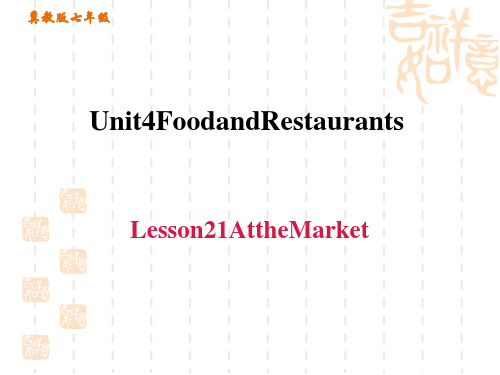

Lesson 21At the Market一、单项选择1.My mother buys ________ watermelon. It tastes sweet.A.a B.an C.the D./2.Lucy is thirsty (渴的), so her mother takes her ________ a tea shop.A.at B.with C.to D./3.Don't worry. We have ________ vegetables in the fridge now.A.much B.many C.little D.few4.—I am just going to the ________. Do you want anything?—Yes, a bag of rice.A.market B.classroomC.library D.park5.The pears look ________. I like them.A.good B.well C.bad D.badly6.—What kind of porridge would you like, Alice?—I would like ________.A.egg porridge B.eggs porridgeC.fish porridges D.fishes porridge7.________ the photo of Jim. He looks so happy.A.Look B.Look atC.Have a look D.Looks8.—Do you like fruit?—Yes. I ________.A.like it very much B.like them a lotC.like a lot it D.very like them9.—What are your favourite vegetables?—________.A.Pears B.GrapesC.Carrots D.Watermelons10.The apples are over there. ________ are good for our health.A.They B.It C.Their D.Its二、用所给词的适当形式填空11.Let's ________ (buy) some vegetables.12.—How about ________ (have) a rest?—Good idea.13.________ (pear) are sweet. I like to eat them.14.People ________ (be) wearing colourful clothes. They are beautiful. 15.I like ________ (grape). They are delicious.三、按要求完成下列各题16.How about going shopping with me? (改为同义句)________ ________ going shopping with me?17.The carrot is my favourite. (改为复数句)The ________ ________ our favourite.18.My mother buys fruit at the market. (对画线部分提问)________ ________ your mother ________ fruit?19.I also like watermelons. (改为同义句)I like watermelons, ________.20.Does your sister like cabbage? (作肯定回答)________,________ ________.四、从方框中选择最佳选项补全对话(有两项多余)A:Let's go to the market.B:Sure. ________21A:I would like to buy some eggs, fruit and vegetables.B:You should write them down.A:OK. ________22B:So many things. ________23A:Yes, they are my favourite fruit.B:I like watermelons. They are sweet.A:________24B:Tomatoes. I like to eat them in soup.A:Do you like pears?B:Yes, I like pears.A:________25B:OK! Let's go.A.Do you like grapes?B.Here is my shopping list.C.How much would you like?D.What would you like to buy?E.What are your favourite vegetables?F.Time to go.G.What about you?五、完形填空(词数:约110;建议用时:5分钟)Today i s S aturday. J ack g oes t o t he s upermarket ________26his m other a nd h is f ather. His parents want ________27some vegetables. There are a lot of big red tomatoes. They like ________28very much. Carrots ________29Jack's sister's favourite, so Mrs. Green also buys some ________30her. Then Jack sees some chicken and French fries. He lets his mother ________31some.After that, Mrs. Green wants to buy new ________32for Jack. Then they go to a shoe store. Mrs. Green finds a pair of red shoes and she likes them very much.________33Jack doesn't like them. He thinks red is for girls. He ________34sad. Then Mrs. Green finds a pair of blue shoes. Jack ________35them. Finally, they buy them and go home happily.26.A.for B.about C.with D.at27.A.buy B.buying C.to buy D.buys28.A.it B.them C.him D.her29.A.is B.are C.am D.be30.A.from B.of C.about D.for31.A.take B.to take C.takes D.taking32.A.shoes B.pants C.jeans D.trousers33.A.And B.But C.So D.Or34.A.are B.looks like C.looks D.is look 35.A.like B.to like C.liking D.likes答案一、1.A 2.C 3.B 4.A 5.A 6.A7.B8.A9.C10.A二、11.buy12.having13.Pears14.are15.grapes三、16.What about17.carrots are18.Where does; buy19.too20.Yes; she does四、21.D22.B23.A24.E25.F五、26.C点拨:句意:杰克和妈妈,爸爸去超市。



